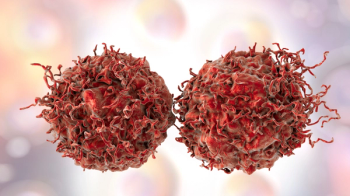
Pediatric Cancer
Latest News
Latest Videos

Podcasts
More News

Black and Hispanic pediatric patients with high-risk neuroblastoma had significantly lower 5-year survival rates in induction and/or consolidation trials.

AYA Cancer Awareness Month offers an opportunity for nurses to go further in supporting AYAs with cancer.

Findings from the phase 1 BrainChild-03 trial support breakthrough designation for BCB-276 for pediatric diffuse intrinsic pontine glioma.

Findings highlighted that increased physical activity was associated with a variety of benefits in improving overall well-being in early adolescent and young adult survivors.

Adolescent and young adult survivors of cancer face increased substance use risks due to developmental delays, limited support, and coping mechanisms, necessitating targeted prevention.

Larotrectinib led to rapid/durable responses and high disease control rates in children with TRK fusion-position central nervous system cancers.

Mirdametinib led to confirmed responses and meaningful pain and health-related quality of life improvements in both children and adults with neurofibromatosis type 1-associated PNs.

The FDA granted elraglusib a rare pediatric disease designation for Ewing sarcoma based on findings from the 1/2 Actuate-1902 trial.

Throughout June, the FDA approved drugs for the treatment of diseases including myelodysplastic syndrome, thyroid cancer, endometrial cancer, colorectal cancer, and follicular lymphoma.

The FDA approved blinatumomab for patients 1 month or older with CD19-positive, Philadelphia chromosome–negative, B-cell precursor acute lymphoblastic leukemia.

Selpercatinib was granted accelerated approval from the FDA for patients aged 2 years and older with thyroid cancer or solid tumors with RET mutations.

Throughout April, the FDA approved drugs for the treatment of diseases including solid tumors, lung cancer, multiple myeloma, bladder cancer, and low-grade glioma.

The FDA approved tovorafenib for certain patients with relapsed or refractory pediatric low-grade glioma.

Lutetium Lu 177 dotatate was approved by the FDA for children aged 12 years and older with somatostatin receptor-positive gastroenteropancreatic neuroendocrine tumors.

The FDA granted LSTA1 rare pediatric disease designation for the treatment of osteosarcoma.

The antibody-drug conjugate inotuzumab ozogamicin was approved by the FDA for the treatment of patients aged 1 year and older with relapsed or refractory CD22-positive B-cell precursor acute lymphoblastic leukemia.

A treatment for NTRK-positive locally advanced or metastatic solid tumors, repotrectinib, is currently under priority review by the FDA and may address a high unmet medical need.

The NCCN has published its first set of treatment recommendations patients with for neuroblastoma.

Oncology nurses can bring creative art to their pediatric patients with cancer, thereby potentially reducing their anxiety levels, research showed.

Proper counseling is needed to help decrease fertility-related psychological distress in adolescent/young adult cancer survivors.

The FDA has approved entrectinib to treat pediatric patients ages 1 month and older with NTRK-positive solid tumors.

The FDA has approved bosutinib to treat pediatric patients with Philadelphia chromosome–positive, chronic-phase chronic myelogenous leukemia.

The resubmitted biologics license application for remestemcel-L has been issued a complete response letter.

Veno-occlusive disease or sinusoidal obstruction syndrome is commonly associated as a complication with transplant in pediatric patients but can also be seen with chemotherapy alone.

The FDA has granted blinatumomab full approval for patients with minimal residual disease–positive B-cell acute lymphoblastic leukemia.










































































































